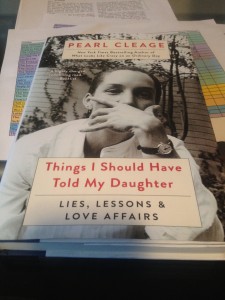From Joshunda’s interview with Pearl Cleage:
A dual history of bias and internalized oppression has kept most black women from publishing their memoirs or journals, Cleage adds, for fear of emotional and economic reprisals. “After slavery ended, black women continued to put forward the idea that we were good, sexually responsible women, going up against the racist stereotypes that came out of the madness of slavery,” Cleage says. “But there was still the fear of being too honest around white people. I don’t feel that’s a legitimate feeling for me. I’m going to tell the truth to whoever is in the room.”
When I read truth, I feel courageous and emboldened. Powerful. Magical. Writing the truth, however, is altogether different. But when I do, that’s when folks nod. Say, I felt that. I needed that. I never knew that. Amen.
From Joshunda: Cleage says she drew her inspiration for the book from the diaries of Anaïs Nin, which she found liberating and inspirational, much like the work of Walker and Shange.
Sounds familiar. Truth is hard to come by in the pages of books, although I must admit I wasn’t exactly searching for it as a younger woman. Discovering it, though, was quite a revelation. Filling. There was that magic, that power I didn’t know I sought. Reading it encouraged me to write it, yet in the beginning I found it hard to lay truths on the page. They were there, but buried. Hidden in metaphor and verse. Rarely plainspoken and clear.
It’s less hard now. But this doesn’t mean easy.
 It’s also slow at times, truth-telling is. Because there’s this contextualizing you have to do. Background building. Setting the stage and what have you.
It’s also slow at times, truth-telling is. Because there’s this contextualizing you have to do. Background building. Setting the stage and what have you.
And then there’s the crafting. Are you conveying what you really mean to say? Who might be hurt? Who might feel misrepresented? Are you true to you?
I did not want to be the traitor, the teller of family secrets – and yet I wanted to be a writer. ~bell hooks
Once you’ve framed it and crafted it, then there’s the time set aside for doubting. Is it too much? Who are you to give voice to this experience? And on it goes.
Until finally you shout, or whisper, “Me, dammit! It’s my truth. I’m telling it!” And you press send or publish as the case may be, and try to move on to the next thing without agonizing so much on the last thing.
And perhaps over time it gets easier. I dunno.
I do know it’s always a digging in. A meditation. A labor of love. Truth-telling is.
It’s freeing for truth and for the one who told it.
It’s difficult. But perhaps no more difficult than any other act of love.
 The rain is tapping a sleepy rhythm outside, and I’ve been fighting sleep (I lost one battle) throughout the day. April showers bring May flowers and all that, but I can’t help but wish for warmer temps to help cheer the gray days.
The rain is tapping a sleepy rhythm outside, and I’ve been fighting sleep (I lost one battle) throughout the day. April showers bring May flowers and all that, but I can’t help but wish for warmer temps to help cheer the gray days.
